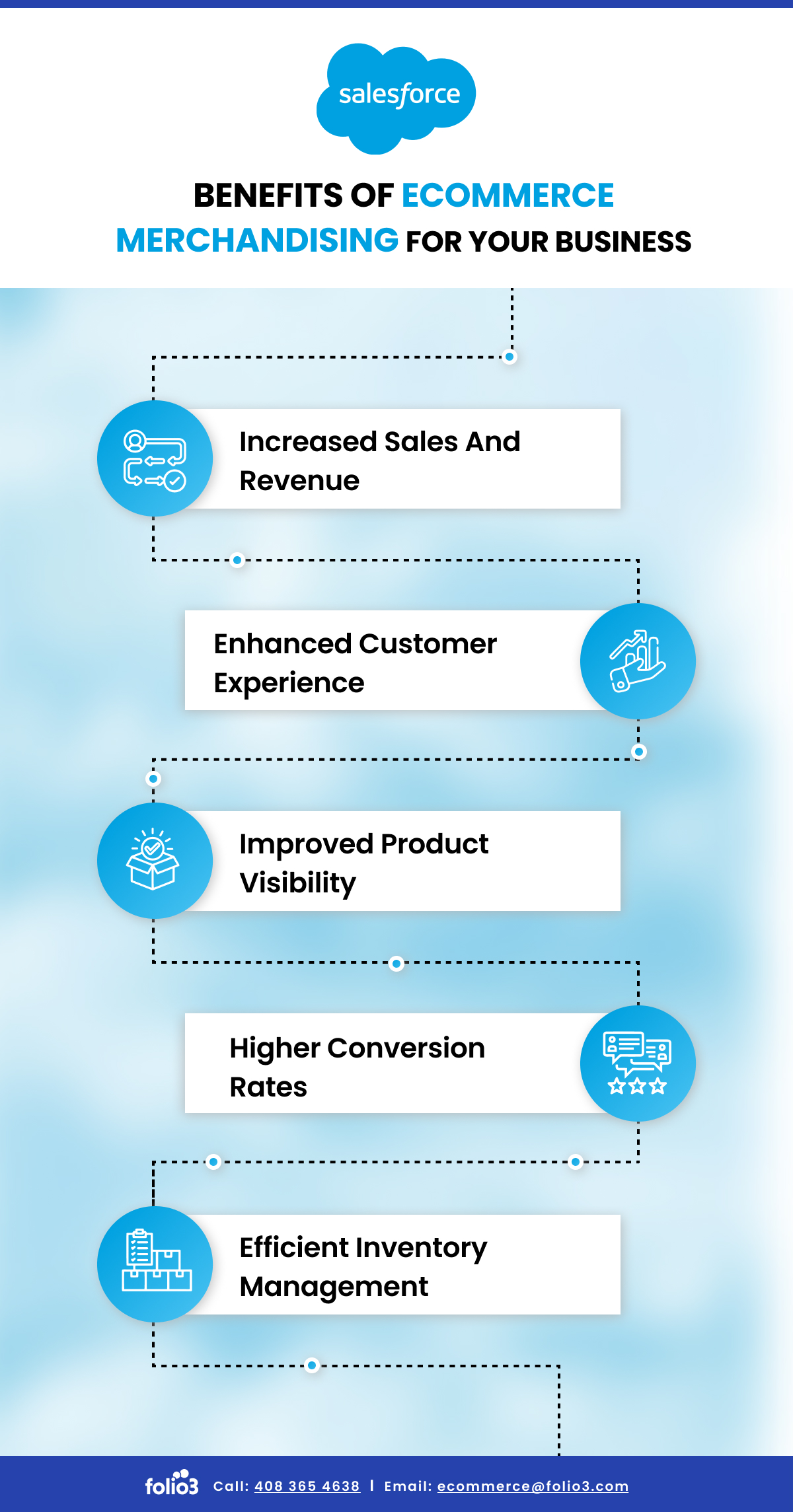Salesforce offers an impressive suite of Salesforce merchandising capabilities, essential for empowering eCommerce stores to achieve remarkable success. With the expertise of a Salesforce implementation partner, businesses can fully leverage these capabilities for optimal performance.
In an increasingly competitive marketplace, a successful eCommerce strategy extends far beyond simply having a user-friendly website. It demands a sophisticated, data-driven approach to Salesforce merchandise strategies, which can be effectively developed and executed with the guidance of a skilled Salesforce Commerce Cloud Developers.
Salesforce’s innovative tools allow businesses to tailor their online presence to meet customer needs, utilizing advanced analytics and AI effectively. This personalization of shopping experiences ranges from meticulous inventory management to creating dynamic, customer-focused displays.
In short, it ensures that every facet of the merchandising sales force is targeted to engage customers, boost sales, and maintain a competitive edge. However, what does it mean to merchandise your site? Let’s take a look at it first!
What Is Meant by Merchandising Your Site?
Merchandising your site involves optimizing your ecommerce platform by analyzing customer data and market trends to enhance customer experience and boost sales.
This strategy includes personalized content, intelligent inventory management, and promotional tactics. Eventually, it creates a dynamic, engaging online storefront tailored to customer preferences and needs.
Merchandising for Ecommerce
Merchandising for ecommerce involves engaging tactics like personalized product recommendations based on customer behavior. These elements, when effectively implemented with the help of tools like Salesforce, ensure a tailored and immersive shopping experience.
For merchandising, especially sales force merchandising, understanding and adapting to customer needs using data-driven insights is key to the success of these strategies.
Ecommerce Merchandising Elements
They are the core components that collectively enhance the shopping experience and drive sales in an online store. These elements include:
Product Selection and Categorization: This involves curating a diverse range of products and organizing them into clear categories. It helps customers navigate and find what they need.
Pricing Strategies and Promotions: Competitive pricing and attractive promotions are essential. This includes discounts, bundled offers, and seasonal sales that entice customers while maintaining profitability.
High-Quality Product Displays: Utilizing professional-grade images and videos to showcase products effectively. This also involves providing detailed product descriptions and specifications. You can also use tools that let you easily change background
to make your product visuals look more professional and consistent.
Data-Driven Insights and Analytics: Using analytics tools to track customer behavior and preferences. This allows for continuous optimization of merchandising strategies.
Site Design and Layout: A well-designed website with a user-friendly interface ensures a seamless shopping experience. It also has easy navigation, mobile optimization, and a visually appealing layout.
Effective Search Functionality: Implementing a robust search tool with filters allows customers to find specific products or categories quickly.
Customer Engagement and Feedback: Incorporating customer reviews, ratings, and Q&A sections helps build trust and inform potential buyers. Interactive elements like live chat can also enhance customer support.
Cross-Selling and Upselling Opportunities: Strategically suggesting related products or upgrades can increase the average order value and improve customer satisfaction.
Benefits of Ecommerce Merchandising for Your Business
The benefits of ecommerce merchandising are multifaceted and significant. By effectively leveraging merchandising strategies, you can achieve several key advantages. Some of them are as follows:
Increased Sales and Revenue: Well-executed merchandising tactics like personalized recommendations and strategic product placement can significantly boost sales. To achieve this goal, you need professional Salesforce Commerce Cloud Development.
Enhanced Customer Experience: Providing a tailored shopping experience increases customer satisfaction. This includes relevant product recommendations and a visually appealing site design.
Improved Product Visibility: Effective merchandising ensures that your products are showcased in the best possible way, increasing their visibility and attractiveness to potential buyers.
Higher Conversion Rates: By creating a more engaging and personalized shopping experience, ecommerce merchandising can lead to higher conversion rates.
Efficient Inventory Management: Merchandising tools can help forecast demand and manage inventory levels effectively, reducing the risk of overstocking or stock outs.
Competitive Advantage: A well-merchandised ecommerce store can stand out in a crowded online marketplace, giving your business a competitive edge.
What are the Benefits of Salesforce Merchandising by Salesforce Cloud Commerce?
Salesforce Commerce Cloud Implementation can be a gamer changer for your business. Salesforce Cloud Commerce offers a suite of technical advantages with merchandising sales force limited. It focuses on enhanced data utilization, system integration, and customer experience optimization. Here are the benefits of using Salesforce merchandise strategies:
AI-Driven Personalization: Sales force merchandising utilizes advanced algorithms to analyze customer data. This provides highly personalized shopping experiences through tailored product recommendations and targeted promotions.
Improved Conversion Optimization: It employs sophisticated segmentation and A/B testing tools to refine product displays and marketing strategies, leading to higher conversion rates and improved ROI.
Seamless System Integration: It offers robust APIs and integration capabilities, allowing for seamless connection with existing CRM systems and inventory management tools, among other things.
Scalable Infrastructure: It’s built on a cloud-based platform, providing scalability and flexibility to handle varying levels of traffic and transaction volumes.
Omnichannel Capabilities: Salesforce merchandising supports a unified commerce approach, integrating online and offline channels to deliver a cohesive customer experience across all touchpoints.
Advanced Checkout and Payment Solutions: It also incorporates optimized checkout flows and a range of payment processing options, which reduces cart abandonment and enhances the payment experience.
Customizable UI/UX Design: It offers customizable templates and design options, allowing businesses to create unique and engaging user interfaces
Conclusion
With its strategic approach to display methods, pricing, and product selection, Salesforce not only defines your brand but also enhances the consumer experience.
By understanding and adapting to customer needs using data-driven insights, you can create a strong online presence and succeed in today’s competitive marketplace. Therefore, take advantage of these powerful Salesforce merchandise tools and strategies to boost sales and improve customer satisfaction.
The best way to do that is to get the help of any Salesforce Commerce Cloud consultants to leverage the expertise of an ecommerce development company that is well-versed in Salesforce merchandising.
FAQs
What Is the Role of Merchandising in Ecommerce?
Ecommerce merchandising is a blend of branding, strategic product placement, and creative presentation to enhance the shopping experience. This approach focuses on showcasing products effectively, with the ultimate objective of guiding the customer seamlessly toward making a purchase decision, exemplified by the ‘Add to Cart’ action.
What Is the Concept of Merchandising?
Merchandising is the strategic presentation and promotion of products in a retail setting to enhance customer engagement and drive sales.
What Is Salesforce B2C Commerce for Merchandisers?
Salesforce B2C commerce for merchandisers enables efficient online product showcasing and customer experience personalization, leveraging consumer behavior analysis to enhance sales.

Hasan Mustafa
Engineering Manager Salesforce at Folio3
Hasan Mustafa delivers tailored Salesforce solutions to meet clients' specific requirements, overseeing the implementation of scenarios aligned with their needs. He leads a team of Salesforce Administrators and Developers, manages pre-sales activities, and spearheads an internal academy focused on educating and mentoring newcomers in understanding the Salesforce ecosystem and guiding them on their professional journey.
